Quick Reference
Are There Benefits to Smoking Herbs?
- Safer than smoking tobacco
- Helps you reduce stress and anxiety
- Improves your mood
- Help with respiratory problems such as bronchitis and asthma
Listen to our quick audio
Do you ever feel stressed out and overwhelmed by the demands of daily life? If so, you're not alone. And we recommend trying smokable herbs.
Adults in the United States are more stressed now than they have been at any other time in the past decade.
One natural way to relax and de-stress is by smoking herbs. Smoking organic herbs is an ancient practice used for centuries to promote relaxation and mindfulness. Herbs are a natural, safe, and non-addictive alternative to tobacco.
Today, many different types of smokable herbs are available so that you can find the perfect blend for your needs.
This blog post will discuss 15 of the best smokable herbs for relaxation and mindfulness. We'll also provide some helpful tips on creating your own herbal smoking blend that is perfect for your needs. So, read on if you're looking for a way to wind down after a long day or are interested in exploring the world of herbal smoking blends.
Fifteen of the best smokable herbs for relaxation and mindfulness:

Mullein
Mullein is a common herb that is found in many herbal blends. It's sometimes called "cow's lungwort" or "hag's taper." But the most exciting thing about Mullein is that it can be used to smoke.
Smoking mullein can help to ease congestion, bronchitis, and asthma. Additionally, it works well as an expectorant to help the lungs remove mucus. The smoke is smooth, gentle, and has a pleasant, slightly sweet flavor.
To smoke Mullein, dry the leaves and flowers and roll them into a cigarette. You can also add other flavoring herbs to your mullein cigarettes, such as lavender or mint, to enhance relaxation.
Apart from smoking, Mullein can also be made into tea. We recommend trying Mullein Leaf Tea.
Marshmallow root
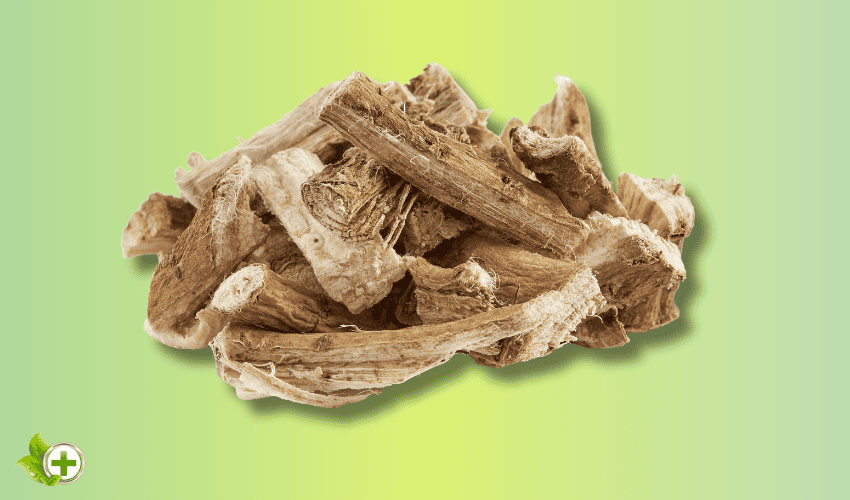
Marshmallow root is a sedative herb that can be smoked or ingested in tea form.
It's an excellent herb for those looking for a more natural way to relax. This root has a calming effect on the body and can help ease anxiety and stress.
A study from the National Library of Medicine showed that marshmallow root contains antibacterial, antifungal, anti-inflammatory, and anti-cough properties.
To smoke marshmallow root, simply add a small amount to your smoking blend. Marshmallow root has a sweet, pleasant taste and can be smoked alone or with other herbs.
If you're using it in tea form, steep one teaspoon of dried herb in a cup of hot water for ten minutes.
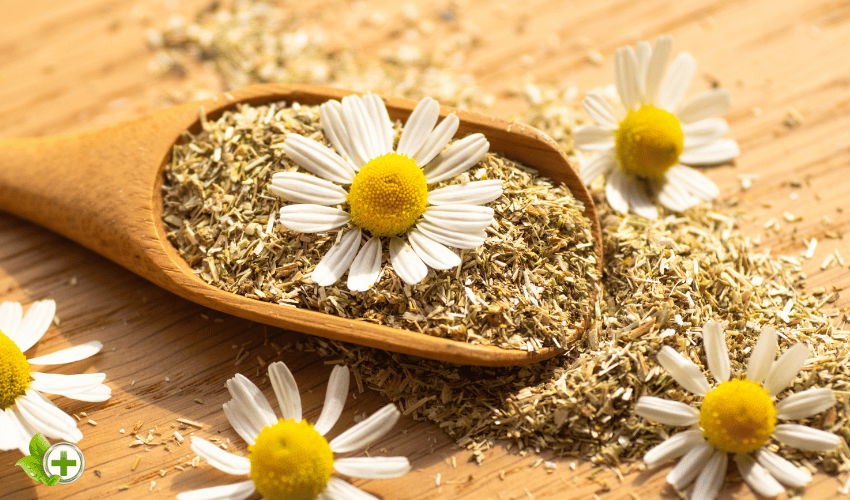
Chamomile
Chamomile is a popular herb with a long history of use in Traditional medicine. Chamomile is best known for its calming and relaxing properties, making it an excellent choice for those looking to wind down after a long day or ease into sleep.
Chamomile can be smoked on its own or blended with other herbs, such as lavender or lemon balm, for even more relaxation.
When smoked, chamomile produces a gentle, sweet-smelling smoke in the lungs. Whether you're looking to relax or find your center, chamomile may be the perfect herb.

Skullcap
Skullcap is a member of the mint family, and its Latin name, Scutellaria lateriflora, literally means "little bowl helmet." The herb gets its common name from its small, stagecoach-shaped flowers.
This powerful herb has a mild sedative effect that can help ease tension and promote sleep. It can be smoked on its own or mixed with other herbs such as lavender or chamomile. Skullcap is also available in tincture or capsule form. When taken before bedtime, a skullcap can help you wake up refreshed and relaxed.
Skullcap is generally considered safe, but pregnant or nursing women should not take it.
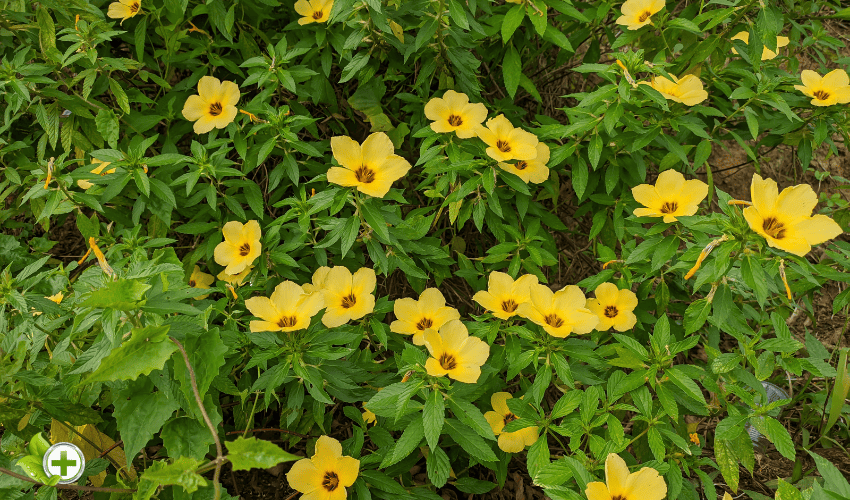
Damiana (turnera diffusa)
This herb is native to Mexico, Central America, and the West Indies. The leaves and stems are used to make tea or smoked. When smoked, damiana has a sweet taste and is often used in smoking blends. This herb is said to be a relaxant and can help with stress and anxiety relief. It can also be used as an aphrodisiac.
Smoking damiana is a relaxing experience that can help soothe the mind and body. This herb can be smoked alone or blended with other herbs for a more enjoyable smoking experience.
Check out our The Best Reviewed Damiana.
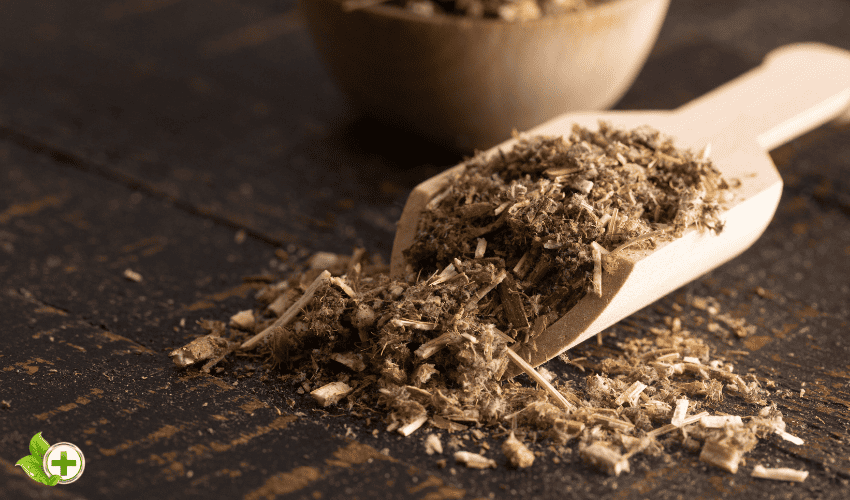
Horehound
Horehound is an herb that is commonly used in cough syrup due to its expectorant qualities, which can help loosen phlegm and soothe the throat. It can also help ease digestion. Horehound has a bitter taste, so it is often blended with other herbs or sweeteners.
Smoking horehound on its own can provide relief from anxiety and stress. It can also help restore focus and concentration. Horehound is safe for most people to smoke, but it is not recommended for pregnant women or those who are breastfeeding.

Mugwort
Mugwort is a common weed that can be found in North America, Europe, and Asia. The plant has been used for centuries in folk medicine and as an ingredient in herbal cigarettes. Mugwort is said to have a relaxant effect on the mind and body, making it a great herb for smokers who want to reduce stress and anxiety.
Smoking mugwort is said to help treat insomnia and nightmares. The herb is also used as a digestive aid and relieves stomach cramps, gas, and bloating.
Mugwort can be smoked alone or blended with herbs such as damiana, hops, lavender, or Mullein.

Red raspberry leaf
Red raspberry leaf is a popular herb for women's health, but it can also be smoked. It is rich in vitamins and minerals, including magnesium, calcium, and iron.
Raspberry leaf can help to relax the uterus and ease cramps. This makes it perfect for women who are dealing with PMS or other menstrual issues.
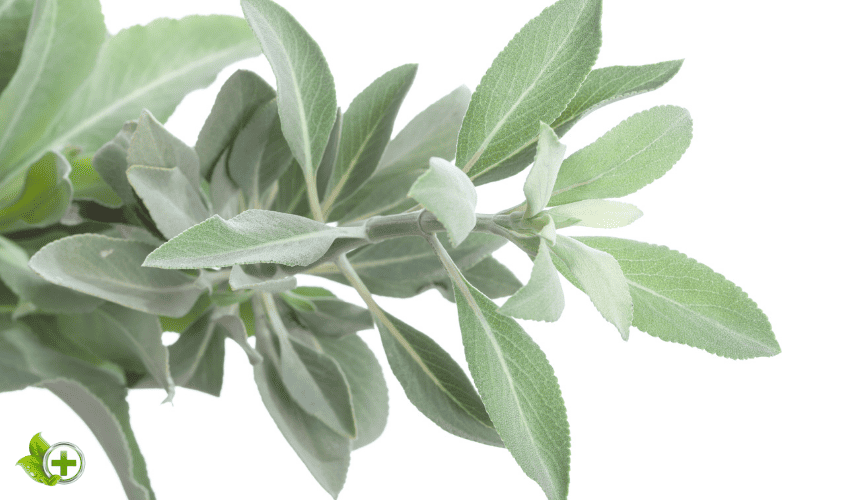
White sage
This herb is commonly used in smudging ceremonies and has a long history of use in Native American cultures. White sage is said to cleanse and purify your space, and it's also used for its medicinal properties. When smoked, white sage can help to clear your sinuses and ease congestion. It's also thought to be a natural anti-inflammatory.
Smoking white sage is said to be a spiritual experience that can connect you with the earth and help to cleanse your aura. If you're looking for an herb to smudge with, white sage is a good choice. familiar

Catnip
Catnip is a common herb native to Europe and Asia and belongs to the mint family. This herb is well-known for its effects on cats, who seem crazy when they smell it. Catnip is also said to have calming effects on humans. It has long been used as a relaxant and sedative, particularly by women during childbirth.
Catnip contains nepetalactone, a chemical that acts on the brain to produce a calming effect. It can be smoked or brewed as tea.
Smoking catnip is said to produce a mild high similar to marijuana. The effects are short-lived, but some people feel more relaxed and calm after smoking catnip. It is also said to help with anxiety and stress relief. Catnip can be found in smoke shops or online.
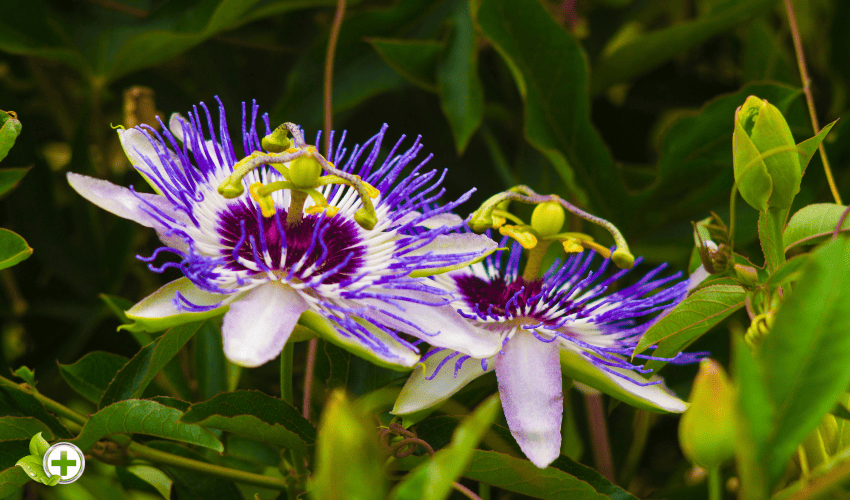
Passionflower
Passionflower is a beautiful, climbing vine native to the Amazon rainforest that produces white, blue, or purple flowers. These Native Americans have been using it for ages to relieve anxiety and insomnia.
The leaves and stems of passionflower contain chemicals that act on the nervous system. Passionflower is used as a sedative to treat anxiety and insomnia. Additionally, it is also used for treating seizures, hysteria, and asthenia.
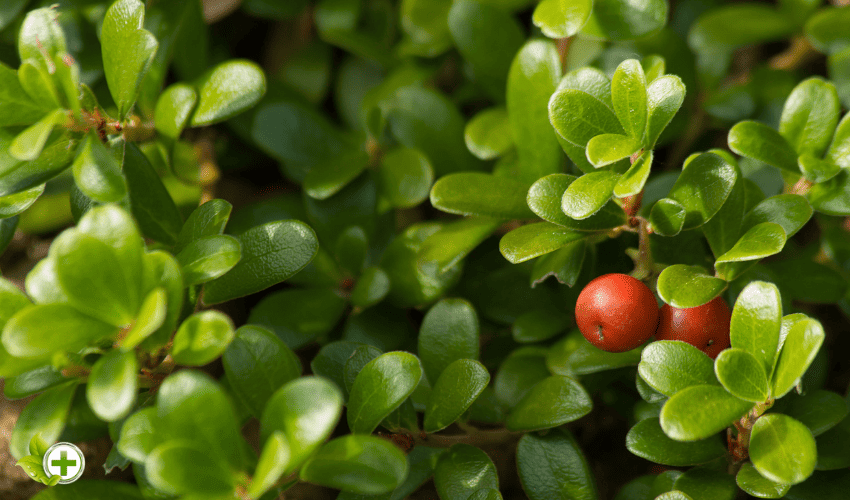
Uva usi
Uva Ursi, also known as Bearberry, is a small shrub that grows in cold, mountainous regions of the Northern Hemisphere. For generations, people have utilized the leaves of this plant to cure urinary tract infections.
Uva Ursi contains a chemical that helps reduce inflammation in the urinary tract. It is also a diuretic, which helps flush out bacteria from the urinary tract.

Valerian root
Valerian root is a perennial herb native to Europe and Asia. Valerian treats insomnia, anxiety, depression, and premenstrual syndrome (PMS). You can use the plant roots to make tea, tinctures, and capsules.
Valerian root increases gamma-aminobutyric acid (GABA) levels in the brain. GABA is a neurotransmitter that helps to regulate anxiety.
Valerian root is generally considered safe but can cause side effects like headaches, upset stomach, and dizziness. You shouldn't consume valerian root if you are breastfeeding or pregnant.
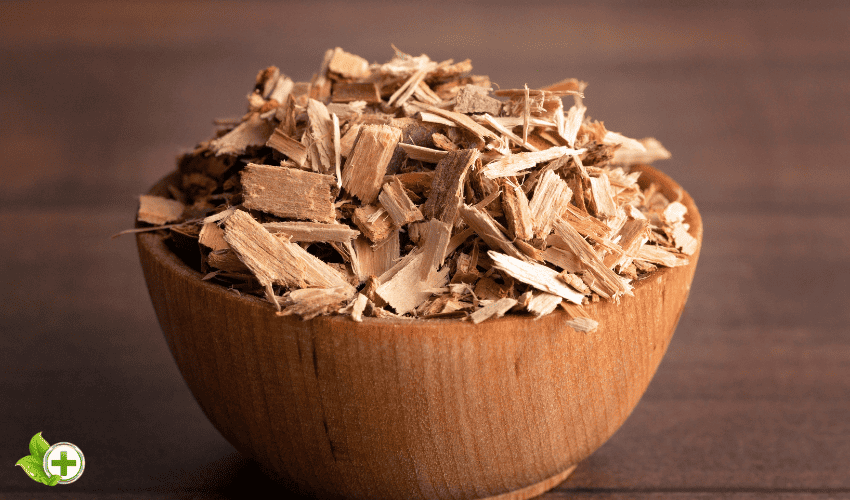
Willow bark
Willow bark has been used for centuries as a natural pain reliever. It contains compounds comparable to those found in aspirin, making it an effective alternative for those sensitive to the drug. Willow bark can be smoked or made into tea.

St. john's wort
When it comes to medicinal plants, St. John's Wort is definitely one of the most well-known. St. John's Wort is a form of perennial herb with yellow flowers that blooms in the summer. Although it originated in Europe and Asia, it is now widespread.
For centuries, this plant has been used to treat various conditions, including depression, anxiety, and sleeplessness.
It has recently become a popular herbal remedy for mild to major depression. St. John's Wort works by increasing serotonin levels in the brain. Serotonin is a neurotransmitter that can affect your mood and emotional well-being.
The herb is available in many forms, including capsules, tablets, teas, and tinctures. Generally, this herb can be well tolerated but can cause side effects such as stomach upset, dry mouth, and dizziness.
Moreover, St. John's Wort may interact with other medications, so it's important to talk to your doctor before taking it.
Are there benefits to smoking herbs?
Smoking herbs is a practice that dates back centuries. Herbal cigarettes were even used in ancient times as a form of medicine.
But are there any actual benefits to smoking herbs today?
Let's take a look at some of the potential benefits of smoking herbs:
- Safety: Smoking smokable herbs is generally considered to be much safer than smoking tobacco. This is because most herbs don't contain nicotine and don't have the same harmful chemicals as tobacco.
- Mood enhancement: Many people find that smoking herb can help to improve their mood. This is likely because smoking relaxes the body and mind and can help you reduce stress and anxiety.
- Relaxation: Many base herbs help people to relax. Smoking chamomile can help to reduce anxiety and promote relaxation.
- Respiratory support: Some people smoke herbs to help with respiratory problems such as bronchitis and asthma. This is because smoking can help to open up the airways and reduce inflammation.
So, there may be some benefits to smoking herbs – but it's not suitable for everyone. If you wish to try it, make sure you try out our The Best Reviewed Rolling Papers for a smooth smoking experience.
Short Video
Conclusion
It doesn't have to be tobacco to be smoke-able. In fact, there are plenty of herbs out there that can be smoked for relaxation or medicinal purposes.
From native Americans to ancient Hindus, many cultures have long understood the benefits of burning certain herbs. Herbal smoking blends can provide nicotine-free relaxation, help ease anxiety or depression, and even be a mindfulness tool.
So if you're looking to wind down at the end of a long day or achieve a more zen state of mind, consider giving some of these smokable herbs a try. Just remember to purchase them from a reputable source and to use them in moderation.
FAQs
What Are Smokable Herbs?
Smokable herbs are any dried plant matter that can be smoked in a pipe or rolled into a joint. The most common smokable herbs are tobacco, cannabis, and Mullein.
What Is The Best Smokable Herb For Relaxation?
People respond differently to different herbs. However, some popular herbs for relaxation include chamomile, lavender, passionflower, and valerian root.
What Are The Side Effects Of Smoking These Herbs?
Smoking can have harmful side effects, including lung damage and cancer. It is important to research any herb you are thinking of smoking before using it. Some herbs on this list may also cause drowsiness or dizziness.







